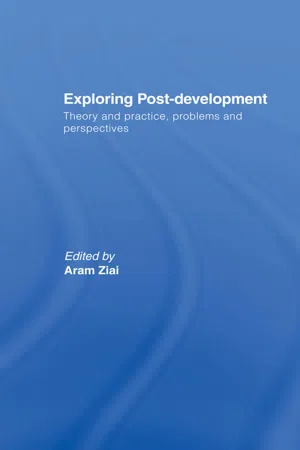
- 256 pages
- English
- ePUB (mobile friendly)
- Available on iOS & Android
eBook - ePub
About this book
Tackling issues surrounding post-development which is arguably one of the most significant debates in the field of north-south relations at the beginning of the twenty-first century. Contributors explore the possibilities and limitations of post-development theory and practice drawing on empirical studies of movements and communities in several continents.
Tools to learn more effectively

Saving Books

Keyword Search

Annotating Text

Listen to it instead
Information
Index
References to notes are prefixed by n.
- absences: sociology of 145–6, 197, 202–4
- activists 220–3
- actor-oriented approach 42, 48, 56–8, 60
- actors: and agency 54
- agency 86
- agricultural change: Fiji 89–91
- alternative development 21, 63, 111, 134, 176–7
- alternative economies 220
- alternatives: to development 5, 176–7, 204–6
- Alvares, C 121, 125n6
- amelioration 85, 91, 95
- ‘anti-essentialism’ 23
- ‘anti-foundationalism’ 23
- anti-globalization movement 197
- Anti-Politics Machine, The 37, 47
- ‘anti-utilitaristic movement’ (MAUSS) 102
- Apffel-Marglin, F 125n14
- Arce, A 24, 42, 58–9
- Arkoun, Mohammed 107
- Ashley, Richard 233n3
- Assets Based Community Development (ABCD) method 160n3
- attentiveness 204
- autonomy 99, 102–7
- balkanization 29
- Banuri, T 118, 123
- Barangay Bunga Ilaya 157
- Barangay Cambugason 157–8
- Bebbington, Anthony 24
- Being (Sein) 65–6
- Being there (Dasein) 67
- Belshaw, C. S 88
- Berlin protests 220–1
- Bloch, Ernst 210
- Bogotá, Colombia 41
- Bohol 148
- Bolivia 174
- borders, open 217–18
- bottom-up development 39–40, 43, 48–9
- Brigg, M 113
- BUKO, the 213–20
- Bundesministerium für wirtschaftliche Zusammenarbeit (BMZ) 213–14
- campaigns 165
- capitalism 18, 85, 163–4, 221
- capitalist productivity 203
- case studies: Cola-Quit Plachimada Campaign 166–76; comida 183–92; Ethiopian development project 47, 48–52; indigenous development 87–94
- Castaneda, Carlos 182
- Castoriadis, Cornelius 99, 102–7
- Cato Manor development project 43
- cattle farming: and cultural exchanges 91–4
- Chambers, R 83
- Coca-Cola 166–71
- ‘cognitive imperialism’ 223
- Cola-Quit Plachimada Campaign 166–76
- collective development 150
- collective identity 76
- Collier, A 136
- Cologne foundation ‘women’s initiative’ 220
- Colombia 175
- Colombian Pacific 21
- colonialism 5
- comida 181, 183–92
- common values 141
- communism 36
- community-based enterprises 156–7
- community economy 154–8
- constructivism 23
- constructivist concept: of culture 117–18
- contamination: of water supplies 167–8, 169
- co...
Table of contents
- Cover Page
- Half Title Page
- Title Page
- Copyright Page
- Contents
- Notes on Contributors
- Acknowledgements
- Introduction
- Development discourse and its critics An introduction to post-development
- ‘Post-development' as concept and social practice
- Theory
- Development The devil we know?
- Post-development and the discourse—agency interface
- On the singular name of post-development Serge Latouche's Destruktion of development and the possibility of emancipation
- Problems
- Pacific indigenous development and post-intentional realities
- Post-development and further Difference from ‘inside' and autonomy
- The ambivalence of post-development Between reactionary populism and radical democracy
- Practice
- What, then, should we do? Insights and experiences of a Senegalese NGO
- Surplus possibilities Post-development and community economies
- Plachimada resistance A post-development social movement metaphor?
- Comida A narrative mirror for the universal concept of nutrition
- Perspectives
- Post-development Unveiling clues for a possible future
- Development, internationalism and social movements A view from the North
- Concluding the exploration Post-development reconsidered
- Index
Frequently asked questions
Yes, you can cancel anytime from the Subscription tab in your account settings on the Perlego website. Your subscription will stay active until the end of your current billing period. Learn how to cancel your subscription
No, books cannot be downloaded as external files, such as PDFs, for use outside of Perlego. However, you can download books within the Perlego app for offline reading on mobile or tablet. Learn how to download books offline
Perlego offers two plans: Essential and Complete
- Essential is ideal for learners and professionals who enjoy exploring a wide range of subjects. Access the Essential Library with 800,000+ trusted titles and best-sellers across business, personal growth, and the humanities. Includes unlimited reading time and Standard Read Aloud voice.
- Complete: Perfect for advanced learners and researchers needing full, unrestricted access. Unlock 1.4M+ books across hundreds of subjects, including academic and specialized titles. The Complete Plan also includes advanced features like Premium Read Aloud and Research Assistant.
We are an online textbook subscription service, where you can get access to an entire online library for less than the price of a single book per month. With over 1 million books across 990+ topics, we’ve got you covered! Learn about our mission
Look out for the read-aloud symbol on your next book to see if you can listen to it. The read-aloud tool reads text aloud for you, highlighting the text as it is being read. You can pause it, speed it up and slow it down. Learn more about Read Aloud
Yes! You can use the Perlego app on both iOS and Android devices to read anytime, anywhere — even offline. Perfect for commutes or when you’re on the go.
Please note we cannot support devices running on iOS 13 and Android 7 or earlier. Learn more about using the app
Please note we cannot support devices running on iOS 13 and Android 7 or earlier. Learn more about using the app
Yes, you can access Exploring Post-Development by Aram Ziai in PDF and/or ePUB format, as well as other popular books in Architecture & Architecture General. We have over one million books available in our catalogue for you to explore.